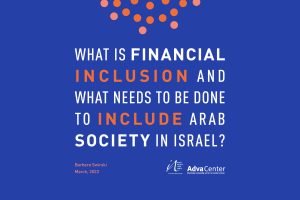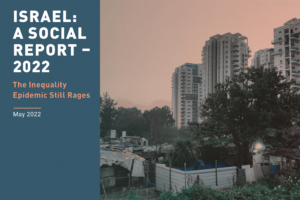What has become eminently clear since the November 2022 elections is that the present government has no interest in promoting financial or any other type of inclusion for Arab citizens
A year ago the Bank of Israel published a National Plan for Increasing Financial Inclusion in the form of a report that collated most of the available data relevant to financial inclusion on two social groups whose use of financial services was below par: Arab citizens and haredi Jews.
The plan was devised following a recommendation by the World Bank. It was drawn up by an interdepartmental committee and included recommendations to be carried out by the various ministries in the coming years.
In the case of Arab citizens, it is not only a citizenship right, the right to benefit from financial services, that is at stake. There is also rampant violence within Arab localities, some of it connected to unpaid debts with local criminal elements.
What exactly is the citizenship right termed “financial inclusion?”
It involves something as simple as putting money in a bank to keep it safe, providing the basis for a mortgage loan, a business loan, or a consumer loan for unexpected household needs. Financial inclusion serves as the basis for digital payments for goods and services and building assets, and facilitates household socioeconomic advancement.
A few telling facts: Only 10% of bank branches are in Arab localities and only 87% of Arab households are banked, compared with nearly 100% of Jewish households; 15% of Arab bank accounts are restricted (meaning they cannot be used for many purposes), compared to 3-4% of Jewish accounts; 72% of Arabs report difficulty obtaining loans to start a business, in contrast to 35% of Jews; and a mere 1.5% of mortgage loans obtained in 2020 were awarded to residents of Arab localities.
On the other side of the ledger, in 2021, the percentage of Arabs among young debtors (aged 18-26) was 63%, while young Arabs constituted a much smaller proportion 28.2% of the total of Israelis: Arabs and Jews, in that age group.
What has become eminently clear since the November 2022 elections is that the present government has no interest in promoting financial or any other type of inclusion for Arab citizens.
Initiatives that were to be taken between 2021 and 2030 (in the framework of Government Resolution 550, along with the recommendations of the Bank of Israel’s 2022 report) appear to have been sidetracked. These are more mortgage loans, bank branches, and culturally-appropriate banking services in Arab localities; far more assistance for those who have fallen into debt; and a multi-year program to promote financial literacy.
The abandonment of inclusionary initiatives for Arab society, whether in the field of finance, education, employment, environment, or support of local government will result in increased hostility and despair on the part of the Arab citizens of Israel and contribute to the ongoing decline we are witnessing in equality, social solidarity and economic vibrancy.
// This article was originally published in The Jerusalem Post






